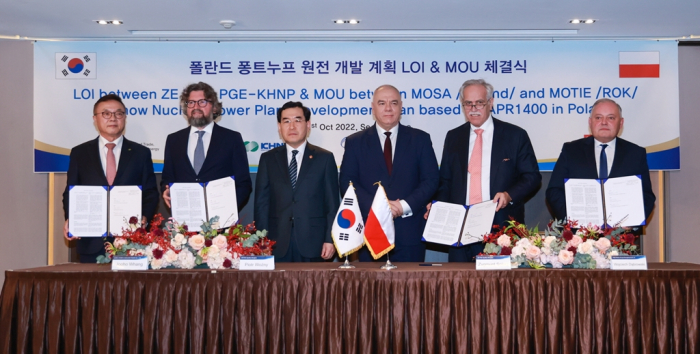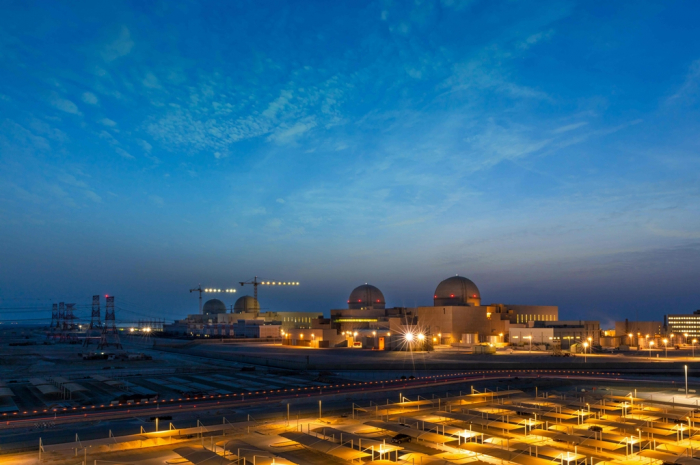Energy
Korea’s KHNP inks nuclear power plant deal with Poland
KHNP and ZE PAK agree to set up basic plans for nuclear power plant, aiming to break ground in 2026 and begin operations in 2033
By Oct 31, 2022 (Gmt+09:00)
4
Min read
Most Read
LG Chem to sell water filter business to Glenwood PE for $692 million


Kyobo Life poised to buy Japan’s SBI Group-owned savings bank


KT&G eyes overseas M&A after rejecting activist fund's offer


StockX in merger talks with Naver’s online reseller Kream


Mirae Asset to be named Korea Post’s core real estate fund operator



Korea Hydro and Nuclear Power Co. (KHNP) signed an initial agreement for a nuclear power plant in Poland, paving the way to win an expected $30 billion contract from the country and export such facilities to other nations in anticipation of growing demand for atomic energy due to energy supply disruptions amid the ongoing Russia-Ukraine war.
KHNP on Monday inked a letter of intent with Poland’s state-run power company Polska Grupa Energetyczna (PGE) and private firm Zespol Elektrowni Patnow-Adamov-Konin (ZE PAK) to build a nuclear power plant that consists of two or four power units with a 1.4-gigawatts (GW) capacity each. That came after the European country selected US Westinghouse Electric for a $40 billion deal to construct Poland’s first nuclear power facility earlier this month.
The South Korean and Polish governments also agreed to support the KHNP project, which would be the Asian country’s first nuclear power plant export deal since 2009 when it signed a $20 billion deal with the United Arab Emirates to build and operate four nuclear reactors.
“The project has reopened the gate for nuclear power plant exports for the first time since the export to the UAE in 2009 while it validates the excellence of the APR-1400,” said South Korean Trade, Industry and Energy Minister Lee Chang-yang, referring to the country’s next-generation reactor model.
The deal came as more countries are interested in nuclear power plants for their energy security as the war between Russia and Ukraine boosted fuel prices. South Korea seeks to export 10 nuclear power plants by 2030.
TO BREAK GROUND IN 2026 AND START OPERATIONS IN 2033
The value of the project was estimated at $30 billion, given a similar project in Egypt, which is building the country’s first nuclear power plant, industry sources in Seoul said. The project will consist of four power units with an electrical output of 1.2 GW for each.
South Korea’s state-run KHNP and ZE PAK agreed to set up basic plans including financing measures, total budget and project schedules with a goal to break ground in 2026 and start operations in 2033. The project will be located in Patnow, where ZE PAK is running a coal power plant.
“We need sources of cheap and stable energy in Poland. Nuclear energy is essential in Polish conditions, especially in the current geopolitical situation,” said Polish Deputy Prime Minister and Minister of State Assets Jacek Sasin.
“We welcome the information that ZE PAK and PGE have entered into talks with KHNP, which will further strengthen relations between Poland and South Korea.”
POLAND’S CHOICE OF THE US AND SOUTH KOREA
Poland selected the US for the country’s first nuclear power plant project and South Korea for a private atomic energy development plan, considering both diplomatic and military cooperations, industry sources in Seoul said.
Polish Prime Minister Mateusz Morawiecki said on Oct. 29 in a tweet that a strong Poland-US alliance guarantees the success of their joint initiatives, announcing the European nation selected Westinghouse due to its “reliable, safe technology.”
The country could not ignore South Korea’s nuclear power plant construction capabilities within planned schedules and budget, which has been proven through the UAE project, industry sources in Seoul said.

South Korea and Poland also recently stepped up their defense cooperation as Warsaw agreed to import various weapons such as Chunmoo multiple launch rocket systems (MLRS), K2 Black Panther tanks, K9 self-propelled howitzers and FA-50 fighter jets.
South Korean President Yoon Suk-yeol met Polish President Andrzej Duda in June on the sidelines of the North Atlantic Treaty Organization (NATO) summit in Madrid, while Seoul trade minister Lee visited Poland and the Czech Republic for deals to export nuclear power plants.
SOUTH KOREA NEEDS MORE COOPERATION WITH WASHINGTON
Seoul, however, needs to further cooperate with the US for more nuclear power plant export deals, industry sources in Seoul said.
Westinghouse has recently filed a lawsuit against KHNP and Korea Electric Power Corp. in a US court, saying the APR-1400 used its technology. That means South Korean companies must get approval from the US government to export the reactor model, Westinghouse argued.
The US company is also competing with South Korean companies and French firm Électricité de France (EDF) in a project to build one or two nuclear power plants in Dukovany, the Czech Republic.
The South Korean government and KHNP expect that the US Court for the District of Columbia will not accept Westinghouse’s claim as Poland and the Czech Republic are not subject to US technology export controls.
Still, escalating conflicts with US companies are likely to create hurdles to South Korea’s exports of nuclear power plants, some sources said.
“The lawsuit by Westinghouse is a business strategy to check the Korean nuclear power industry,” said one of the sources. “The government urgently needs to cooperate and continue its discussions with Washington to maintain the alliance on the nuclear power plants between the two countries.”
Write to Ji-Hoon Lee and So-Hyeon Kim at lizi@hankyung.com
Jongwoo Cheon edited this article.
More to Read
-
 EnergyKorea’s KHNP likely to sign nuclear power plant deal with Poland
EnergyKorea’s KHNP likely to sign nuclear power plant deal with PolandOct 21, 2022 (Gmt+09:00)
2 Min read -
 Aerospace & DefenseKorea eyes $20 bn in weapons exports as Hanwha inks $6 bn Polish deal
Aerospace & DefenseKorea eyes $20 bn in weapons exports as Hanwha inks $6 bn Polish dealOct 20, 2022 (Gmt+09:00)
2 Min read -
 Aerospace & DefenseKAI signs $3 bn fighter jet export contract with Poland
Aerospace & DefenseKAI signs $3 bn fighter jet export contract with PolandSep 19, 2022 (Gmt+09:00)
1 Min read -
 Aerospace & DefenseHyundai, Hanwha ink $5.8 bn defense deals with Poland
Aerospace & DefenseHyundai, Hanwha ink $5.8 bn defense deals with PolandAug 26, 2022 (Gmt+09:00)
1 Min read -
 EnergyKorea wins $2.25 bn deal to build Egypt's 1st nuclear power plant
EnergyKorea wins $2.25 bn deal to build Egypt's 1st nuclear power plantAug 25, 2022 (Gmt+09:00)
2 Min read
Comment 0
LOG IN


